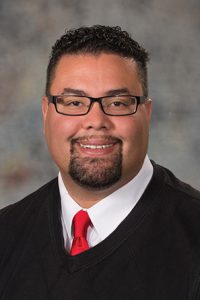Urban affairs omnibus bill debated
A bill intended to clean up language in state law related to the governing of cities was amended on general file March 20.

LB873, introduced by the Urban Affairs Committee, would make a variety of clean-up changes including clarifying terms and eliminating antiquated and unnecessary language.
Omaha Sen. Justin Wayne, chairperson of the committee, said some state laws governing the management of the state’s cities and villages have not been updated since 1943, and some date back to the 1800s.
“In 2014, the Urban Affairs Committee began a multi-year effort to update and modernize the statutes governing various classes of municipalities,” Wayne said.
An amendment offered by Omaha Sen. Ernie Chambers to remove an outdated state symbol letterhead requirement for state agencies was approved 30-0.
Sen. Adam Morfeld of Lincoln brought an amendment to add provisions of his LB756, adopted 25-1, which would prohibit municipalities from adopting or enforcing an ordinance or regulation that prohibits the use of a property as a short-term rental, unless necessary to protect public health and safety.
Morfeld said that last year there were 46,000 short-term rentals—defined as a stay of not more than 30 consecutive days—in Nebraska, adding more than $4.3 million to the state’s economy.
“Opening Nebraska up to Airbnb and similar services encourages tourism not only to urban areas but also areas of Nebraska that remain untouched,” he said. “Additionally, it provides extra income to average Nebraskans.”
The amendment would authorize an online hosting platform to enter into an agreement with the state tax commissioner to collect and pay applicable sales taxes imposed under Nebraska law on behalf of short-term renters.
As introduced, the amendment also would have limited the audit authority of the tax commissioner in regard to short-term rentals. After concerns were expressed by Columbus Sen. Paul Schumacher, that provision was considered separately and defeated on a vote of 3-25.
An Urban Affairs Committee amendment, adopted 27-14, added provisions of six additional bills:
• LB735, introduced by Bellevue Sen. Carol Blood, which clarifies that municipalities have the authority to enter into an interlocal agreement with a county in which the extra-territorial zoning jurisdiction of the municipality is located to provide for joint and cooperative action to abate, remove or prevent nuisances within the ETJ;
• LB748, introduced by Lincoln Sen. Matt Hansen, which would clarify references to municipal population thresholds, providing that such thresholds are met based on either the most recent federal decennial census or the most recent revised certified count by the U.S. Bureau of the Census;
• LB765, introduced by the Urban Affairs Committee, which would amend sections of law governing first class cities to clarify that they apply only to first class cities;
• LB768, introduced by Grand Island Sen. Dan Quick, which would authorize first- and second-class cities and villages to make grants and loans under the Local Option Municipal Economic Development Act for early childhood infrastructure development;
• LB854, also introduced by Quick, which would allow any Nebraska municipality to create a land bank under the Nebraska Municipal Land Bank Act and clarify that land banks may enter into agreements under the Interlocal Cooperation Act for the joint administration of multiple land banks; and
• LB880, introduced by Hansen, which would require cities to include an early childhood element in their comprehensive plans no later than Jan. 1, 2022, either when adopting a new or updating an existing comprehensive plan.
Debate focused on the provisions related to expanding land bank authority statewide. Currently, only municipalities in Douglas and Sarpy counties are eligible under state law to create land banks, or tax-exempt political subdivisions that acquire, manage and develop vacant and tax-delinquent properties.
Lincoln Sen. Mike Hilgers expressed concern that the Omaha-area pilot program has not been in place long enough to know whether it is a good idea for other parts of Nebraska.
While the Omaha experience may be positive, he said, lawmakers should make sure proper safeguards are in place so that the authority of unelected board members to enter the commercial marketplace isn’t abused.
“Before we allow a structure to be authorized throughout the state of Nebraska in which we’re dealing with unelected individuals who are both utilizing taxpayer dollars and getting involved in private enterprise … I think we ought to think very carefully about that.”
Sen. Suzanne Geist of Lincoln agreed and offered an amendment to strike the land bank provisions from the bill. She said that she was hesitant to give taxing authority to another government entity.
“I appreciate the need for economic development; I think that is important,” Geist said. “Bottom line, though: I see the land bank as [having] the potential for abuse.”
Wayne pointed out that land banks do not have taxing authority currently, nor would they gain it under the committee amendment. Land banks are formed to acquire delinquent properties that are not paying property taxes, rehabilitate them and return them to the tax rolls, he said.
“No taxpayer is on the hook because [the land banks] have no taxing authority,” Wayne said.
Quick said many communities across the state, including Grand Island, are struggling with vacant and problem properties and would like additional tools to address the issue.
“Right now, there is no way to deal with those properties,” he said. “The land bank is the way to do it.”
After three hours of debate, the Legislature moved to another item on the agenda. Per a practice implemented last year by Speaker Jim Scheer, the sponsor of a bill that is facing a potential filibuster must demonstrate sufficient support for a cloture motion before the measure will be scheduled for additional debate.

